🎥 Watch the full lecture:
We now have a full video explanation for this article. Watch it below:
1. Overview of CJ CheilJedang and the Role of Globalization in Its Expansion
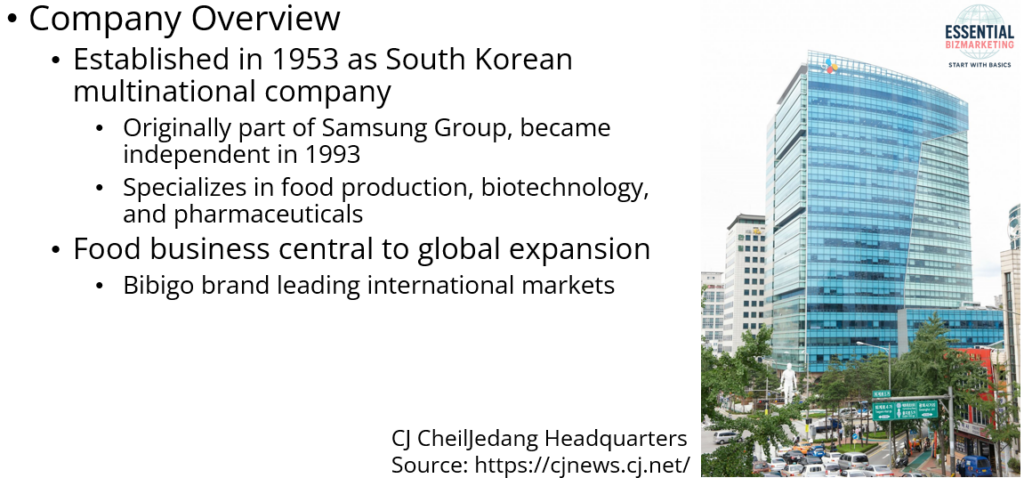
CJ CheilJedang, established in 1953, is a leading South Korean multinational company specializing in food production, biotechnology, and pharmaceuticals. Originally part of the Samsung Group, the company became independent in 1993 and has since evolved into a global food powerhouse. As a subsidiary of CJ Group, CJ CheilJedang operates across multiple sectors, including food and food services, biotechnology, entertainment and media, as well as retail and logistics. Among these divisions, its food business has played a particularly crucial role in expanding the global presence of Korean cuisine, with the Bibigo brand leading the way in international markets.

Globalization has been a key driver in CJ CheilJedang’s transformation from a domestic food manufacturer to a globally recognized company. As international trade has become more interconnected, consumer interest in diverse and authentic global cuisines has surged. The rise of the Korean Wave (Hallyu)—spurred by K-pop, Korean dramas, and films—has further fueled the global appetite for Korean food, creating opportunities for companies like CJ CheilJedang to expand their presence abroad. The company’s ability to leverage global supply chains, improve distribution networks, and take advantage of e-commerce and retail partnerships has allowed it to efficiently deliver its products to consumers in North America, Europe, and Asia.
The growing demand for convenience foods and premium, health-conscious options has also worked in CJ CheilJedang’s favor. Consumers in major markets such as the United States, China, and Europe are increasingly seeking high-quality, easy-to-prepare meals that fit their busy lifestyles. CJ CheilJedang has successfully positioned its Bibigo brand to meet these needs by offering products that combine the authenticity of Korean flavors with the convenience of modern frozen food solutions.
To support its global expansion, CJ CheilJedang has strategically invested in manufacturing facilities and acquisitions across different regions. The company operates major production plants in South Korea, the United States, China, Vietnam, and Germany, ensuring a well-integrated supply chain that facilitates market penetration. By acquiring foreign companies and forming partnerships with local distributors, CJ CheilJedang has been able to adapt its products to regional tastes while maintaining the authenticity of Korean cuisine.
Among its extensive product portfolio, Bibigo dumplings have emerged as one of CJ CheilJedang’s most successful international offerings. Through a combination of aggressive market expansion, strategic branding, and cultural adaptation, the company has successfully introduced Korean-style dumplings to a global audience, making Bibigo the leading frozen dumpling brand in multiple regions. The continued expansion of Bibigo into new markets demonstrates how CJ CheilJedang has effectively harnessed globalization to elevate Korean cuisine onto the world stage.
2. Bibigo Dumplings: The Globalization of Korean Cuisine
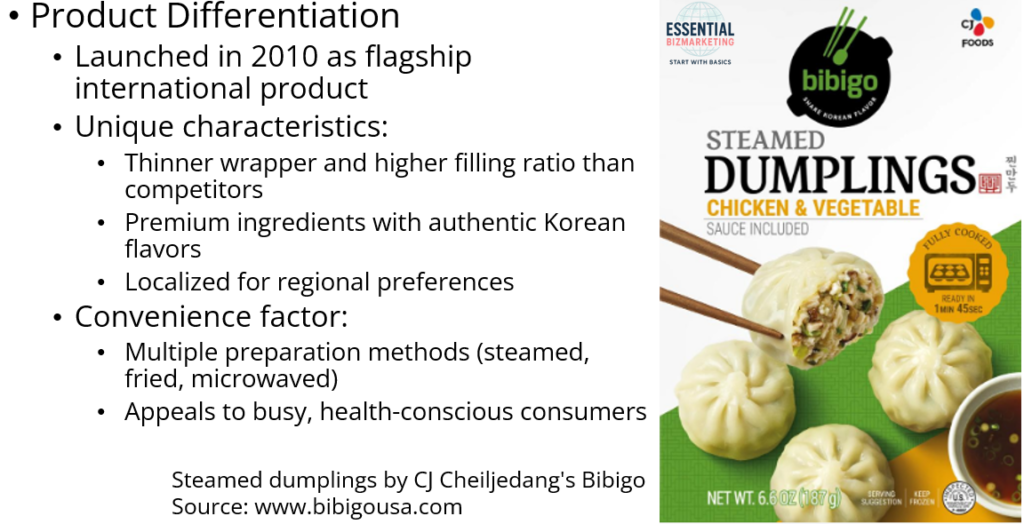
As part of CJ CheilJedang’s international expansion strategy, the Bibigo brand was launched in 2010 to introduce Korean cuisine to global consumers. Among its various offerings, Bibigo dumplings have become the brand’s flagship product, achieving remarkable success in both Asian and Western markets. Unlike traditional Chinese dumplings, Bibigo dumplings have a thinner wrapper and a higher filling-to-wrapper ratio, which enhances their texture and juiciness. This unique quality, combined with authentic Korean flavors, has helped differentiate Bibigo from its competitors.
Bibigo dumplings are made with high-quality ingredients, including premium meats, fresh vegetables, and traditional Korean seasonings such as kimchi, glass noodles, and bulgogi marinade. While maintaining the essence of Korean cuisine, CJ CheilJedang has localized certain flavors to cater to different regional preferences. In the United States, for example, Bibigo offers chicken and cilantro dumplings, which align with American flavor preferences, while in China, it emphasizes pork and chive dumplings, a classic combination favored by Chinese consumers.
One of the main drivers of Bibigo’s success has been its ability to combine traditional flavors with modern convenience. Consumers today, especially in fast-paced urban environments, are looking for quick yet high-quality meal solutions. Bibigo dumplings can be prepared in multiple ways—steamed, pan-fried, deep-fried, air-fried, or microwaved—making them a versatile option for a wide range of consumers. This focus on convenience has positioned Bibigo as a premium alternative to traditional frozen dumplings, making it particularly attractive in markets such as North America and Europe, where quality and ease of preparation are key purchasing factors.
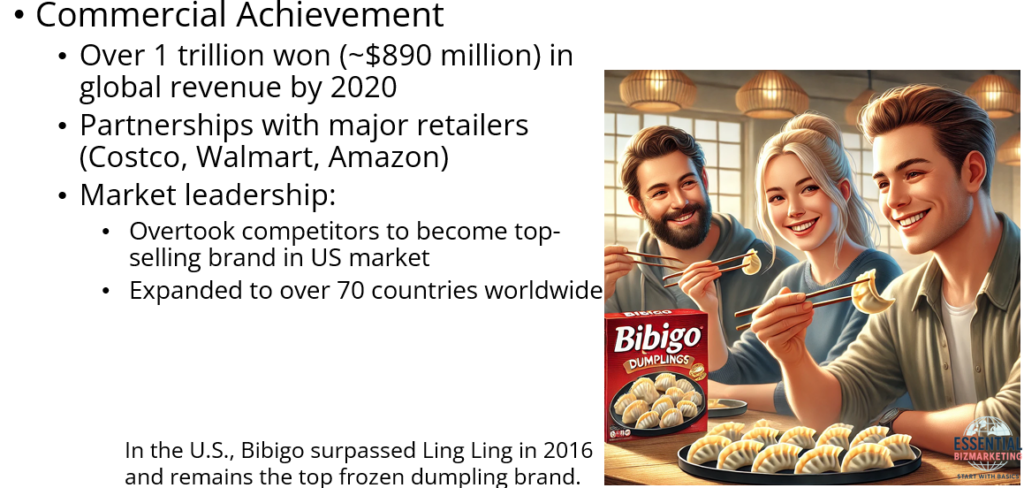
Since its launch, Bibigo dumplings have consistently grown in sales, surpassing 1 trillion won (approximately $890 million) in global revenue by 2020. The brand has also secured partnerships with major retailers, including Costco, Walmart, and Amazon, making its products widely available to consumers across different demographics. In the U.S. alone, Bibigo overtook Ling Ling dumplings in 2016 to become the top-selling frozen dumpling brand, a position it continues to hold today.
Bibigo’s rise to prominence reflects the power of globalization in reshaping consumer tastes. By effectively adapting Korean flavors to international markets, CJ CheilJedang has created a globally recognized brand that continues to expand its influence in the frozen food sector.
3. Bibigo’s Global Expansion and Market Presence
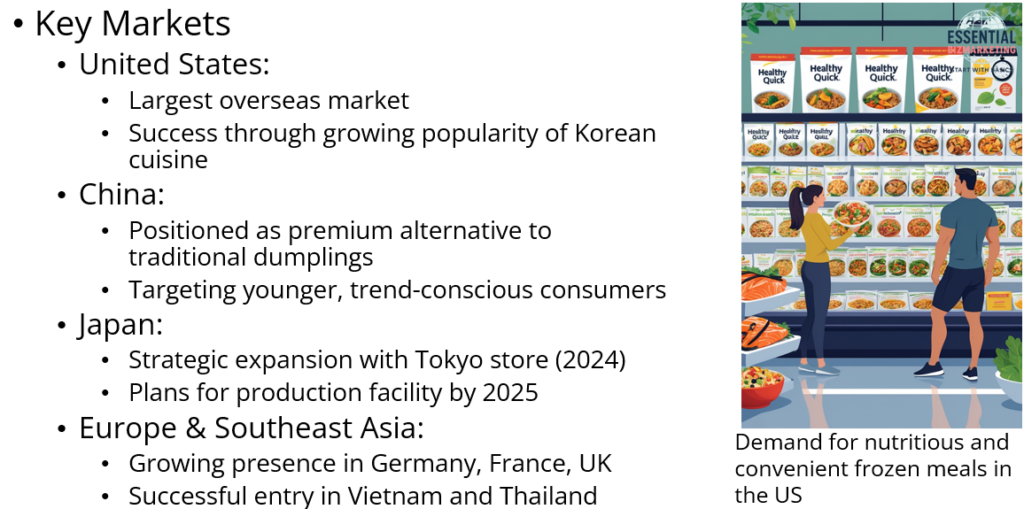
Building on the success of Bibigo dumplings, CJ CheilJedang has rapidly expanded the brand’s global footprint, establishing a presence in over 70 countries. Each market presents unique opportunities and challenges, requiring localized marketing strategies and distribution networks.
The United States is Bibigo’s largest overseas market, where the dumplings have become widely available through grocery stores, club retailers, and e-commerce platforms. The brand’s success in the U.S. is largely due to the growing popularity of Korean cuisine and the demand for healthy yet convenient frozen meals. With Korean food becoming more mainstream, Bibigo dumplings have successfully positioned themselves as a premium, easy-to-prepare meal option.
In China, where dumplings are a staple of the local diet, Bibigo faces intense competition from established domestic brands. However, CJ CheilJedang has leveraged the rising influence of Korean pop culture to attract younger consumers, positioning Bibigo as a trendy, premium product. Unlike traditional Chinese dumplings, Bibigo’s thinner wrapper and modern branding appeal to a more urban and health-conscious demographic.
In Japan, CJ CheilJedang initially introduced Bibigo dumplings through OEM (Original Equipment Manufacturer) partnerships, working with local producers to manufacture and distribute the product. However, as part of its expansion strategy, the company opened a dedicated Bibigo store in Tokyo in 2024 and is planning to establish its own production facility in Japan by 2025. This move is expected to strengthen its market presence by ensuring better control over production and quality standards.
In Europe, Bibigo has gained traction in countries such as Germany, France, and the UK, where consumers are increasingly interested in high-quality frozen Asian cuisine. The brand has positioned itself as a premium, health-conscious alternative to traditional dumplings, appealing to European consumers who prioritize fresh ingredients and convenience.
In Southeast Asia, particularly Vietnam and Thailand, Bibigo has successfully entered the market through local distributors and retail partnerships. The region’s familiarity with dumpling-style dishes has made it easier for Bibigo to establish a foothold, though it faces competition from regional brands specializing in dim sum and dumplings.
The continued expansion of Bibigo into new markets demonstrates CJ CheilJedang’s ability to leverage globalization, using its expertise in branding, production, and market adaptation to compete successfully on an international scale.
4. Competitive Landscape: How Bibigo Competes Internationally
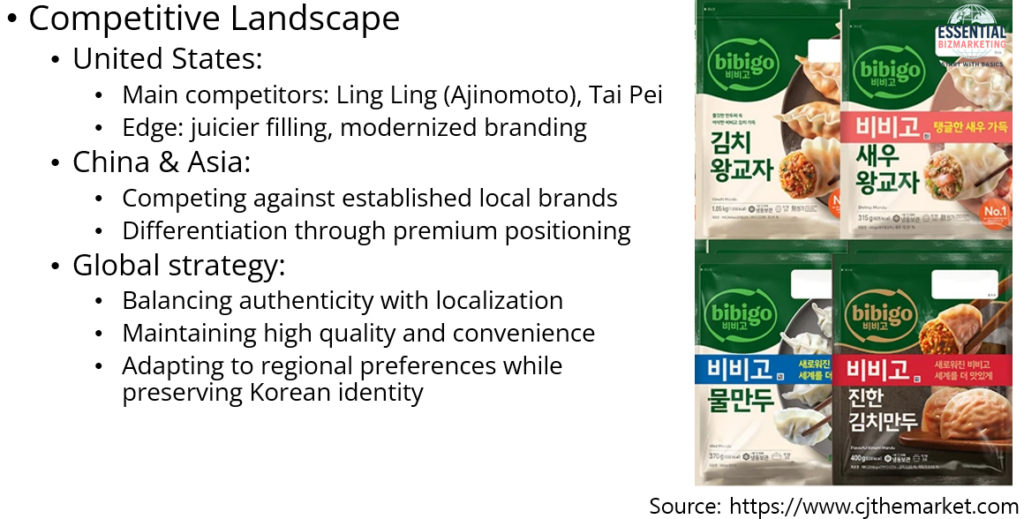
Despite its strong global presence, Bibigo faces intense competition from both local and international brands, each of which has distinct advantages in their respective markets.
In the United States, Bibigo’s biggest competitor is Ling Ling dumplings, owned by Japanese food giant Ajinomoto. Ling Ling had long dominated the U.S. frozen dumpling market, offering a wide range of potstickers with an emphasis on traditional Asian flavors. However, Bibigo surpassed Ling Ling by focusing on a juicier filling, thinner wrapper, and a modernized branding approach that appealed to both mainstream American consumers and Asian-American communities. Tai Pei dumplings, another competitor in the U.S., targets budget-conscious consumers by offering affordable frozen dumplings with familiar flavors.
In China, Bibigo competes against Sanquan Foods and Synear Foods, both of which have extensive distribution networks and a strong reputation for producing traditional Chinese dumplings. Chinese consumers generally favor locally made dumplings, as they are perceived to be more authentic. To counter this, Bibigo has positioned itself as a premium, international brand, attracting younger, trend-conscious consumers who are open to trying new flavors.
In Japan, Bibigo’s main competition comes from Ajinomoto’s gyoza products, which have dominated the frozen dumpling market for decades. Japanese consumers have high expectations for texture, consistency, and taste, making it crucial for Bibigo to adapt its products to local preferences while maintaining its distinct Korean identity.
In Europe, Bibigo faces competitors such as Itsu in the UK, which markets its dumplings as a health-conscious, low-calorie, high-protein meal option. Additionally, Ajinomoto Europe continues to expand its presence, leveraging its well-established distribution channels and retailer relationships.
In Southeast Asia, CP Foods, a Thai multinational, is the leading producer of frozen and ready-to-eat meals, including dumplings and dim sum products tailored to local tastes. Singapore-based Prima Taste also provides strong competition, specializing in premium Asian frozen foods.
Bibigo differentiates itself by offering a fusion of traditional Korean craftsmanship and modern convenience, positioning its dumplings as a premium, globally appealing product. As demand for Asian frozen foods continues to rise, CJ CheilJedang’s ability to adapt to regional tastes while maintaining the authenticity of Korean cuisine will be key to sustaining its competitive advantage.
With globalization driving the evolution of food markets, Bibigo’s strategic expansion showcases how CJ CheilJedang has successfully integrated Korean cuisine into the international food industry. The company’s ability to balance authenticity with localization, while maintaining high quality and convenience, will ensure its continued dominance in the frozen dumpling sector.
📚 References
CJ CheilJedang. (n.d.-a). Our company. CJ Newsroom. Retrieved March 2025, from https://newsroom.cj.net/our-company/
CJ CheilJedang. (n.d.-b). Bibigo in Germany: Capturing the European market. CJ Newsroom. Retrieved from https://www.cj.co.kr/en/newsroom/stories/detail/25
Korea Times. (2025, March). Bibigo expands global footprint, reaching 70 countries with sales surpassing 1 trillion won. Retrieved from https://www.koreatimes.co.kr/www/tech/2025/03/129_366891.html
Business Korea. (2023, October). Bibigo dominates U.S. frozen dumpling market with 42% share. Retrieved from https://www.businesskorea.co.kr/news/articleView.html?idxno=231340
LinkedIn. (2025, March). Frozen dumplings market size & competition analysis. Retrieved from https://www.linkedin.com/pulse/frozen-dumplings-market-size-share-global-analysis-report-3muse/
Simply Recipes. (2025, January). Best store-bought dumplings, according to food experts. Retrieved from https://www.simplyrecipes.com/best-store-bought-dumplings-food-experts-8775468
Wikipedia. (n.d.). CJ CheilJedang. Retrieved March 2025, from https://en.wikipedia.org/wiki/CJ_CheilJedang
KED Global. (2024, January 15). Harvard Business School case study: Bibigo’s global expansion strategy. Retrieved from https://www.kedglobal.com/korean-food/newsView/ked202401150005
📁 Start exploring the Blog
📘 Or learn more About this site
🧵 Or follow along on X (Twitter)
📺 Prefer video? Watch our lessons on YouTube
🔎 Looking for sharp perspectives on global trade and markets?
I recommend @GONOGO_Korea as a resource I trust and regularly learn from.
